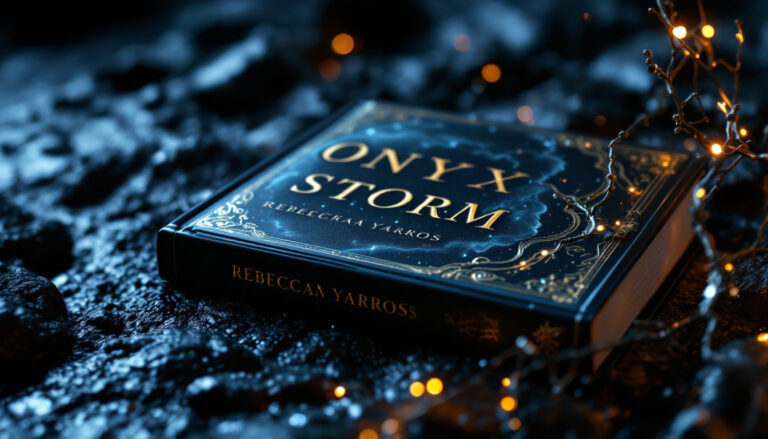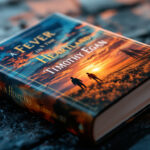The Lost Bookshop by Evie Woods – A Genuine Review for Readers
What if a bookshop could change your life—or even disappear altogether? Evie Woods’ The Lost Bookshop is a captivating blend of magical realism, historical fiction, and romance that invites readers into a story about love, resilience, and the power of books. Set between the 1920s and present-day Dublin, the novel explores the lives of three unforgettable characters as they navigate personal struggles, a hidden manuscript, and a mysterious bookshop that seems to hold all the answers. Whether you’re a seasoned bibliophile or just starting to lose yourself in the world of stories, this book offers a unique escape that’s both heartwarming and deeply thought-provoking.
Plot Overview
The dual timelines in The Lost Bookshop by Evie Woods offer a richly woven tale of passion, resilience, and the mysterious ways stories shape lives. From the literary heart of 1920s Paris to the bustling streets of contemporary Dublin, the narrative is an exploration of love, memory, and the transformative power of books.
The Historical Setting of 1921 Paris
Opaline’s journey begins in the vibrant artistic and literary hub of 1921 Paris. Set against the backdrop of the iconic Shakespeare and Company bookstore, this storyline immerses readers into a world brimming with creativity and rebellion. Founded by Sylvia Beach, the original Shakespeare and Company was more than a bookstore–it was a haven for artists, writers, and thinkers such as Ernest Hemingway and James Joyce (learn more about its history here).
Opaline’s narrative intertwines with this historical setting, capturing the era’s free-spirited energy and its role in shaping modern literature. The inclusion of Shakespeare and Company isn’t simply a setting but a character in its own right, bringing magic and intrigue to Opaline’s personal quest. As she navigates love and loss within these walls, readers are transported to a time when each book held the promise of revolution.
Martha and Henry’s Present-Day Storyline
Meanwhile, in the present-day timeline, readers meet Martha and Henry, whose lives unfold in Dublin. Their connection to the enigmatic, disappearing bookshop pulls them into a mystical journey. This magical bookshop serves as a bridge between the past and present, offering both characters a chance to resolve their grief and rediscover their purpose.
Martha’s story is one of self-discovery, as she faces the weight of her responsibilities and her own unmet desires. Henry’s emotional struggles mirror hers, creating a compelling parallel to Opaline’s journey from the past. Together, their encounters with the bookshop reveal its purpose: to provide not just stories, but answers to life’s most difficult questions.
By blending the grounded realism of Dublin with elements of magic, this part of the narrative shows how books can touch lives in ways we never expect (here’s an insightful review of the novel).
Together, the intertwined stories of Opaline, Martha, and Henry create a vivid tapestry that celebrates the hidden powers of bookshops. Each timeline enriches the other, making The Lost Bookshop a story that will linger with readers long after the final page is turned.
Main Themes and Messages
Evie Woods’ The Lost Bookshop is more than just a tale of love, loss, and mystery—it is a story that dives into the profound ways that stories, relationships, and magical connections shape who we are. At its heart, the novel weaves together universal themes that resonate across time, leaving readers with much to reflect upon. Here’s a closer look at the main themes explored in this captivating book.
The Influence of Books and Literature
Books, in The Lost Bookshop, act as both lifeboats and lighthouses for the characters. They aren’t just stories—they are escapes, therapies, and tools of empowerment. For characters like Opaline, who grows up in the restrictive environment of 1920s Paris, books and literature offer a bridge to a freer, more fulfilling world. Whether it’s through her time at the iconic Shakespeare and Company bookstore or her connection to works of revolutionary authors, books empower Opaline to dream bigger.
Similarly, Martha and Henry, in present-day Dublin, find that the mysterious bookshop isn’t just vanishing and reappearing—it’s inviting them to view their struggles differently. The idea that books hold answers to life’s greatest challenges is emphasized throughout the narrative. As one reviewer notes, the bookshop’s mysteries encourage characters to pause and heal through the wisdom found in its pages (Roelia Reads).
The Struggles of Freedom and Self-Identity
At its core, the book delves into self-identity and freedom. Characters in both timelines navigate deeply personal challenges, such as escaping abusive relationships or societal constraints. Opaline’s journey sees her resisting an arranged marriage and oppressive family expectations, while Martha’s life in contemporary Dublin reflects the quieter, yet equally challenging, struggles of rediscovering her purpose after trauma.
Henry’s character also delivers poignant moments of self-reflection, as he struggles with societal pressures and his past grief. These parallel narratives underline how, across generations, the fight for identity and autonomy remains universal. Evie Woods paints these struggles not as isolated moments, but as part of life’s bigger canvas, encouraging her readers to embrace their individual journeys (Jen Meds Book Reviews).
Magical Realism in The Lost Bookshop
The layers of magical realism in this novel elevate it beyond a conventional dual-timeline story. The disappearing bookshop, brimming with its own secrets, is symbolic of hope, mystery, and the blending of past and present. This magical thread ties the characters together across decades and allows them to revisit memories, confront unresolved emotions, and grow.
Readers quickly realize the magic isn’t intrusive but rather a subtle yet significant element that shapes the narrative. The mystical and the ordinary coexist beautifully, offering a sense of wonder without feeling contrived. This use of magic adds a dreamlike quality that amplifies the thematic depth, a strength noted in reviews from sources like Laurie is Reading and Wikipedia.
As the characters navigate the lines between reality and imagination, the bookshop becomes a metaphor for the healing power of embracing the unknown. It challenges the reader to consider: what if the answers we seek are just a story—or a piece of magic—away?
Character Development
In The Lost Bookshop by Evie Woods, the characters are at the heart of the story, each with their own struggles, transformations, and defining moments. Through Opaline Carlisle, Martha Winter, and Henry Field, the novel offers a rich exploration of personal growth, resilience, and discovery. This section dives into how these characters evolve within the narrative and the pivotal roles they play in the book’s themes.
Opaline Carlisle’s Journey: Finding Strength in Literature
Opaline’s story resonates with anyone who has faced societal and familial constraints. As a young woman in 1920s Paris, her life is dictated by her oppressive brother, who forces her into a life she does not want. But Opaline isn’t content to follow someone else’s rules. With determination and a deep love for books, she breaks away from expectations and carves her own path. Her transition from a timid figure to someone empowered through literature is inspiring.
Books become a lifeline for Opaline. They are more than stories; they are acts of rebellion, tools for self-expression, and windows into a freer world. Her time at the iconic Shakespeare and Company bookstore is a key turning point. Surrounded by the works of revolutionary authors and the vibrant energy of expatriate writers, Opaline begins to see the possibilities of a life shaped by her own choices (read more about the bookstore’s history here). Literature doesn’t just save her; it helps her redefine herself.
Martha Winter’s Resilience: Rising Through Challenges
In contrast to Opaline, Martha’s challenges feel more contemporary. A middle-aged woman in modern-day Dublin, she is dealing with the weight of her responsibilities and the scars of her past. Martha is not a flashy character, but her quiet resilience is just as compelling. Her journey is about finding her voice and reclaiming her identity.
As the story unfolds, Martha faces obstacles that push her to examine what she truly wants from life. The vanishing bookshop becomes a space where she reflects on her sacrifices and how they shaped her. Though her steps toward healing may seem small, they are significant. By connecting with literature and embracing its wisdom, Martha’s transformation unfolds slowly but meaningfully. Her story reminds readers that it’s never too late to rewrite your narrative (discover more about the book here).
Henry Field’s Quest for the Lost Bookshop: Discovering Purpose
Henry’s story adds an element of mystery and adventure to the book. As a character, he is driven by curiosity and an ache for something more profound in his life. His search for the disappearing bookshop is not just a physical journey but a symbolic quest for meaning and closure. The shop represents unresolved emotions and the potential for healing.
Through Henry, readers explore the idea that some places—or experiences—can only be found by those who truly need them. The bookshop serves as a bridge between past and present, allowing Henry to confront grief while embracing new beginnings. His determination to uncover its secrets emphasizes how important it is to chase what stirs your soul, even if finding it feels impossible (learn more about Henry’s character-driven elements here). Henry’s arc reiterates the magical realism that ties the story together, blending the extraordinary with the deeply personal.
These three characters—Opaline, Martha, and Henry—demonstrate the many forms that growth can take. Whether through personal rebellion, a journey of healing, or a search for connection, their transformations remind us of the enduring power of stories to guide and shape us.
Strengths of the Novel
Evie Woods’ The Lost Bookshop has resonated with readers for its unique storytelling, memorable characters, and a narrative that bridges time, space, and emotion. Below, we’ll explore key aspects of the book that have captivated readers and earned critical praise.
A Narrative That Balances Heart and Intrigue
The dual timelines in The Lost Bookshop combine historical richness with modern-day emotional depth, creating a story that appeals to a wide range of readers. The seamless transition between 1920s Paris and present-day Dublin gives the novel an almost cinematic quality. Each timeline is perfectly calibrated to reveal just enough to keep you turning pages while holding back enough to maintain the mystery.
The historical storyline, set in the world of Parisian bookstores, feels like a love letter to literary history. Meanwhile, the present-day arc captures raw human emotions, making it relatable to readers facing modern struggles. From the mysterious vanishing bookshop to the deeply personal journeys of the characters, Woods weaves in suspense and magic without ever overshadowing the human heart of the story (source).
Authentic and Memorable Characters
At its core, the novel’s strength lies in its fully developed characters. Opaline, Martha, and Henry are more than just protagonists; they feel like real people, each defined by their vulnerabilities and strengths. Opaline’s defiance against societal constraints makes her a compelling figure, while Martha’s quiet resilience portrays the weight of contemporary struggles many readers can relate to.
Henry’s curiosity and emotional journey represent the universal human desire for connection and closure. The characters don’t merely exist within their respective timelines—they push boundaries, confront unresolved emotions, and grow in ways that leave lasting impressions. As one reviewer noted, these characters “live off the page” and reflect both the magic and messiness of real life (source).
Beautifully Realized Settings
From the bustling streets of modern Dublin to the inspiring hub of 1920s Paris, The Lost Bookshop is as much a feast for the senses as it is for the imagination. Woods transports her readers effortlessly through detailed settings that feel alive, whether it’s the charm of Sylvia Beach’s Shakespeare and Company bookstore or the ethereal mystery of the disappearing bookshop.
The vivid descriptions evoke nostalgia and curiosity, making readers feel like they’re inhabiting the spaces alongside the characters. It’s a rare talent to make settings feel like characters themselves, but Woods achieves this gracefully, bringing both time periods to life in ways that enrich the overall experience (source).
Blending Magic with Reality
One of the book’s most endearing strengths is its understated yet impactful use of magical realism. The vanishing bookshop is more than a fantastical element; it serves as a metaphor for hope, healing, and the transformative power of literature. This subtle magic blends seamlessly with the story’s realistic layers, making the extraordinary feel entirely plausible.
Through this magical touch, Woods invites readers to consider the deeper meanings within their own lives. The bookshop becomes a symbol of redemption and self-discovery, reminding us that even in our darkest moments, there’s always a door waiting to be opened. This nuanced approach is what elevates the novel beyond conventional storytelling (source).
Thoughtful Literary References
Woods’ integration of literary references throughout the novel adds an extra layer of charm for book lovers. By anchoring the story in iconic literary history, she creates a treasure trove of connections that deepen the experience for readers who share a passion for books. From subtle nods to James Joyce to the evocative role of Shakespeare and Company, the references feel both organic and purposeful. They offer a refreshing sense of connection between the fictional world of the novel and the rich tapestry of real-world literature (source).
A Story for Book Lovers and Beyond
Ultimately, The Lost Bookshop succeeds because it embraces a universal truth: stories have the power to shape our lives. Whether through the courage to break free from societal expectations, the strength to heal from personal loss, or the reminder that magic exists in unexpected places, Woods’ writing resonates with seasoned bibliophiles and casual readers alike.
Criticisms and Weaknesses
While The Lost Bookshop by Evie Woods has captivated many readers with its magical realism and dual-timeline narrative, it’s not without its flaws. Examining these aspects allows for a balanced understanding of the book’s overall impact.
Handling of Sensitive Topics
One of the more contentious elements of The Lost Bookshop is its approach to themes like domestic abuse and trauma. These topics are undeniably significant and add depth to the story, but for some readers, the presentation can feel overwhelming or out of sync with the novel’s otherwise whimsical tone. Domestic abuse, for example, is tackled head-on, with graphic descriptions of both physical and emotional pain (source). While this approach highlights the seriousness of the subject, the juxtaposition of such distressing content with lighter magical elements can feel disjointed.
Some readers have expressed discomfort with this tonal imbalance, likening it to having two conflicting genres within one book. On platforms like The StoryGraph, critiques point out that these heavier scenes sometimes conflict with the enchanting, almost dreamy backdrop of the magical bookshop (source). It raises an important question: does mixing stark realism with a fantastical setting enhance or dilute the reader’s engagement?
It’s also worth noting that these themes might make the book unsuitable for younger readers or those looking for a purely escapist experience. While addressing tough topics is important, the execution may leave some readers feeling emotionally jarred.
Execution of Dual Timelines
The dual-timeline structure in The Lost Bookshop is central to its narrative, yet it’s not without its challenges. While many readers appreciate the layered storytelling, others have found the transitions between the 1920s and present-day chapters slightly jarring. The shifts occasionally disrupt the pacing, making it harder for readers to remain fully engrossed in either timeline.
One critique is that the historical Paris storyline comes across as more fleshed out and vibrant compared to the modern Dublin setting. As a result, readers may find themselves more invested in Opaline’s journey than Martha and Henry’s, which creates an imbalance in the overall narrative engagement (source). This uneven attention to detail between the two timelines could potentially dilute the emotional impact of the modern-day characters’ stories.
Some reviews also suggest that the dual timelines occasionally veer into predictability, particularly when events in one timeline mirror those in the other. While this structure has the potential for emotional resonance, overuse of parallels can make the narrative feel formulaic rather than innovative (source).
Moreover, the shifts in timeline and narrative sometimes create inconsistencies or unanswered questions, especially around the magical aspects of the bookshop itself. While some ambiguity is a hallmark of magical realism, readers looking for clear resolutions might find themselves frustrated.
These criticisms don’t overshadow the strengths of The Lost Bookshop, but they do offer food for thought. They highlight the complexities in blending heavy themes with lighter elements and the challenges of balancing dual narratives in a way that fully engages readers.
Who Should Read The Lost Bookshop?
Evie Woods’ The Lost Bookshop is not just a book—it’s an experience built for readers who crave a mix of storytelling magic, emotional depth, and literary nostalgia. Whether you’re someone deeply connected to the written word or a casual book lover, there’s something here for everyone. Here’s a breakdown of who will truly enjoy this unique novel.
Fans of Historical Fiction
If you love diving into the past and experiencing life through the eyes of characters from another era, this book is a treat. Set partially in 1920s Paris, the novel immerses readers in the world of iconic bookshops like Shakespeare and Company, offering a nostalgic nod to literary legends like James Joyce. The historical timeline gives depth and texture, bringing the vibrant, rebellious energy of the Roaring Twenties to life (read more about its appeal here).
Historical fiction fans will appreciate how carefully the book weaves real-world settings and figures into its narrative. The attention to detail makes it feel authentic, yet the story remains deeply emotional and character-driven.
Lovers of Magical Realism
Do you enjoy stories where the ordinary blends with the extraordinary? This novel’s disappearing bookshop, with its mystical allure, is a perfect fit for fans of magical realism. Unlike overly fantastical tales, the magic in this book is subtle yet captivating—it feels believable and enhances the story without overshadowing the characters or their journeys.
The magical elements serve as a metaphor for life’s mysteries and unanswered questions. Readers who love being surprised by sprinkles of wonder and whimsy will find The Lost Bookshop impossible to put down (explore how readers feel about its magical aspects here).
Booklovers Who See Themselves in Stories
This book was written for anyone who feels a deep emotional connection to bookstores, libraries, and the stories within them. If you’ve ever felt transported by a book or found comfort in the aisles of a bookshop, you’ll resonate with this story. It celebrates the idea that books and the spaces that hold them are more than just objects—they’re lifelines, mirrors, and doorways to other worlds (one reviewer shares their sentiment here).
Readers Who Value Strong Characters
At its heart, this is a character-driven story. Those who enjoy personal transformation arcs and relationships that feel real will love following Opaline, Martha, and Henry as they navigate their trials. Each character brings a unique perspective, and their struggles touch on universal themes like identity, freedom, and healing.
Whether you’re rooting for Opaline to escape her oppressive circumstances in 1920s Paris or connecting with Martha’s quiet journey of rediscovery in modern Dublin, you’ll see pieces of yourself in their struggles and triumphs.
Those Looking for a Bit of Escapism With Substance
Sometimes, you want a story that takes you out of your world while leaving you with something to think about. The Lost Bookshop strikes that balance beautifully. It provides enough mystery, drama, and emotion to hold your attention, with a touch of magic to make it memorable. At the same time, it tackles profound themes like grief, self-discovery, and the power of storytelling in a way that feels sincere (another review highlights the mix of escapism and depth here).
If you’re looking for a book that will stick with you long after you close the last page, this is one to add to your reading list.
Conclusion
The Lost Bookshop by Evie Woods is a heartfelt tribute to the transformative power of stories and the solace we find in books. While some aspects of the execution may divide opinions, the novel’s charm lies in its layered characters, magical elements, and the emotional depth of its themes.
For anyone who cherishes the nostalgia of bookshops or enjoys stories that blend the ordinary with the extraordinary, this book offers a rewarding escape. Don’t let mixed reviews deter you—there’s something special here for readers willing to embrace its unique quirks.
Pick it up, step into the vanishing bookshop, and let its magic remind you why stories matter. What’s a memorable book that changed your life? Let’s discuss!







